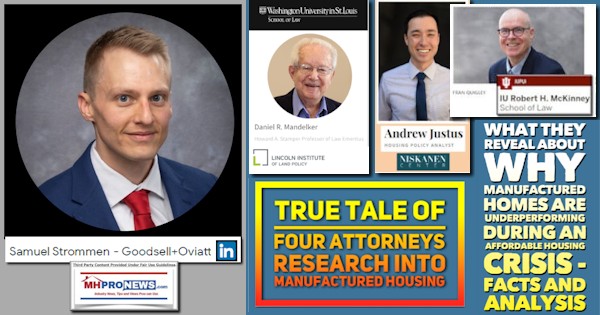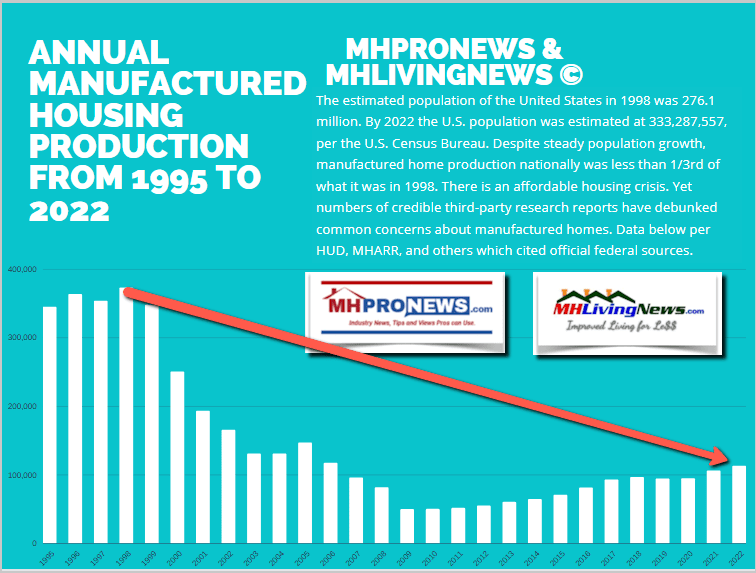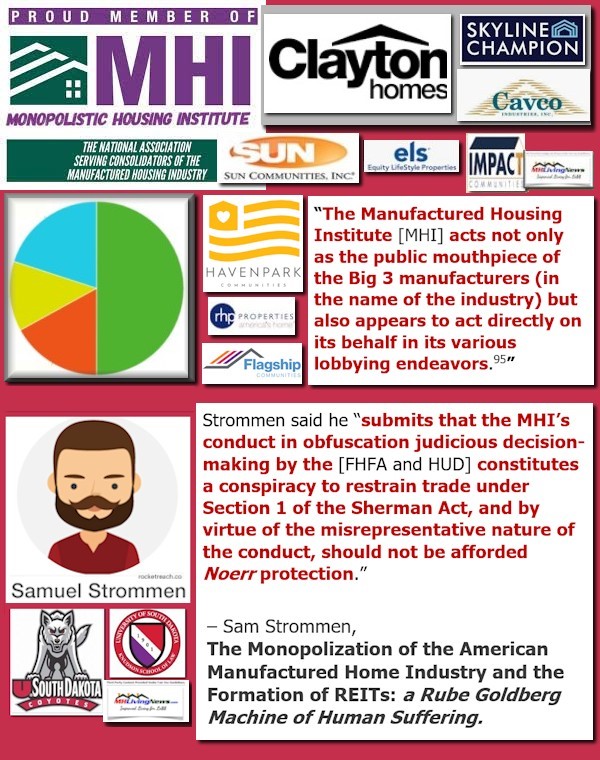Stating the obvious can be eye opening. Truth can be discovered wherever a person happens to find it. Some research provides useful information and couples it with sound analysis or commentary. By contrast, some reports may provide useful information but couple it with flawed or agenda driven analysis. As Mobile and Manufactured Home Living News (ManufacturedHomeLivingNews.com or MHLivingNews.com) has reported for years, there are scores of third-party research and reports that demonstrate that manufactured homes are the most proven form of permeant affordable housing in the later 20th and 21st centuries. Nevertheless, the manufactured home industry has been underperforming as an industry as measured both by historic sales and production levels and as measured by the industry’s potential for well over two decades.
The following is adapted from a press release by ManufacturedHomeProNews.com (a.k.a. MHProNews.com) and will be followed by “the Quisling factor.”
Part I.
Research by 4 Attorneys & 2 Analysts-Manufactured Home Industry and Manufactured Housing Institute Performance Spotlight
Fran Quigley, Andrew Justus, Daniel Mandelker, Samuel Strommen, Gregory Palm, James Schmitz Jr. explored promise and woes in their reports on manufactured homes.
WINTER HAVEN, FLORIDA, UNITED STATES, June 12, 2023 /EINPresswire.com/ — ManufacturedHomeLivingNews.com (MHLivingNews.com) and ManufacturedHomeProNews.com (MHProNews.com) have published a series of new reports exploring research by four attorneys, an investment analyst, and a senior economic expert which report the underperformance of the manufactured housing industry in general and/or identify the Manufactured Housing Institute’s (MHI) controversial role in particular. Those legal professionals, analyst, and economist are broadly outsiders looking into why manufactured homes, which they generally praise, is an underperforming industry during an affordable housing crisis.
Reuters said Gregory Palm is a: “Senior Research Analyst; Craig-Hallum Capital Group LLC, Research Division.” Palm’s position brings him into contact with publicly-traded manufactured housing producers, as well as companies in other industries. Palm sought a response from William “Bill” Boor, president, and CEO of Cavco Industries (CVCO) on this topic. “I think everybody is trying to get a sense for why at least [manufactured housing] industry production data was so weak. And not just calendar Q1, but March [2023] specifically.” A report on MHProNews provides Boor’s response, the Cavco earnings call transcript, and expert analysis of the various statements, linked below.
Palm’s point could be rephrased: ‘Why is the manufactured housing industry underperforming during an affordable housing crisis?’ Cavco’s CEO Boor is also the Vice Chairman of the Manufactured Housing Institute (MHI), the largest U.S. national manufactured housing industry trade group.
Cavco’s investor relations (IR) presentation for 2023 was provided and examined in a report linked below. Cavco’s presentation included two images with analysis provided with this press release. They make several powerful points, including remarks by National Association of Home Builders CEO, Jerry Howard, who per Cavco said: “…[in] no market in this country can a home builder built a house that is affordable for a first time homebuyer.”
Per Cavco: “Shortage of affordable housing costs American economy $2 T[rillion annually] in lower wages and productivity.” Cavco also said that some 6 million new housing units are needed. Conventional builders can’t keep up with the current needs, nor can they meet the price points for affordable home seekers. These facts from Cavco support the points made by Minneapolis Federal Reserve Senior Economist, James A. “Jim” Schmitz, Jr. who asserted that manufactured homes are needed to meet the needs for affordable housing. Cavco’s research and related information in the report with analysis below. make numerous points about why manufactured housing has so much upside historically and in terms of current and pending U.S. housing needs.
The NAHB tweeted on 5.23.2023 that: “Sales of new single family [conventional, site built] homes grew 4.1% in April to an annual rate of 683,000, 11.8% higher than in April 2022. Median sales price ($420,800) and average sales price ($501,000) were both down significantly compared to March 2023.” Cavco in the report above cited the Manufactured Housing Institute (MHI) and said the average retail sales price for a new manufactured homes in 2023 is $108,000 vs. $365,000 for a site-built house (both costs figured for the home only, without land costs).
That’s a natural pivot to attorney Andrew Justus’ research and observations. Justus’ evidence-based op-ed for The Hill asked: “What is Holding Manufactured Homes Back?”
Justus is a housing policy analyst for the Niskanen Center, which Influence Watch says “is a nominally libertarian 501(c)(3) environmental think tank with ties to center-left environmental groups.” Per Justus, the following.
“The term “manufactured housing” often comes with negative connotations: poorly maintained homes, sub-par quality, and aesthetically unappealing. This unfavorable stereotyping belies the fact that today’s HUD Code manufactured homes are not unlike the ugly duckling flourishing to a refined adulthood. Before the [HUD] Code’s adoption in 1976, what were then called “mobile homes” were built to lower standards for strength, durability, and efficiency. This saddles modern manufactured homes with a poor reputation [e.g.: ‘trailer house] inherited from their predecessors, when in fact they offer more diverse configurations and higher-quality housing options.”
Justus dispelled outdated stereotypes and explores possible solutions to making manufactured housing more accessible for the public. Justus’ thoughts with analysis are in the report linked below.
“Getting Zoning for Manufactured Housing Right” is a working paper published by the Lincoln Institute for Land Policy authored by law professor emeritus Daniel R. Mandelker, J.D.
Mandelker said in part: “Unequal treatment in zoning ordinances is a major barrier to manufactured housing.” Mandelker also said that “A support organization is needed that can provide litigation and legislative support to help manufactured housing advocates with zoning reform.”
The report and analysis include a look at the Manufactured Housing Improvement Act of 2000 (MHIA), two sides to the concept of “enhanced preemption” to overcome zoning barriers as the authority given to the U.S. Department of Housing and Urban Development (HUD).
On paper, both MHI and the Manufactured Housing Association for Regulatory Reform (MHARR) seem to have similar positions, both asserting that HUD has that “enhanced preemption” authority. See the video posted below for the view of the late attorney and HUD’s first administrator for the Office of Manufactured Housing Programs (OMHP) Bill Matchneer, who has also asserted “enhanced preemption” authority for HUD under the MHIA. Matchneer’s remarks are examined in contrast to those of HUD Secretary Marcia Fudge in the report linked here, when Secretary Fudge said: “Until We Start to Address This We Are Going to Continue to be Perpetually in This Kind of Situation.”
Those legal and expert insights are explored through the lens of a fresh look at Samuel Strommen’s deep and well-footnoted research into manufactured housing. While Mandelker obliquely indicated MHI was failing the industry and that another association was needed to address lobbying and legal issues, Strommen was more pointed. Strommen alleged serious antitrust violations by MHI and others: “this would appear to be a strategy not dissimilar to the old cup-and-ball trick: a misdirection by MHI at the behest of its principal benefactors—the Big 3—an act of skillful subterfuge to misdirect the government in one area, allowing the Big 3 to engage in anticompetitive in another area unabated.” That groundbreaking report is linked below.
##
Notice: the graphic below can be expanded to a larger size.
See the instructions below the graphic below or click the image and follow the prompts.

Part II – The Quisling Factor – Additional Information with More MHLivingNews Analysis and Commentary
It may seem like an odd notion to numbers that people that some inside manufactured housing History has its share of “Benedict Arnolds'” and Quislings.
According to Oxford Languages, a definition of quisling is as follows.
-
a traitor who collaborates with an enemy force occupying their country.
They knew. They lied. It wasn’t from a bat at the Wuhan Wet Market. And they knew it all along, and mocked and censored anyone who told the truth. https://t.co/VzhYf9dfXI
— Robert F. Kennedy Jr (@RobertKennedyJr) June 13, 2023
Doctors are waking up too. Thousands of them are speaking out against Covid-era corruption. “We were duped.” @jimmy_dore https://t.co/fTgHToqNp3
— Robert F. Kennedy Jr (@RobertKennedyJr) June 12, 2023


HUD researchers Pamela Blumental and Regina Gray said approaching two years ago that the causes and cures for the affordable housing crisis are well known and have been for 50 years.

On the political right, there are an array of candidates, several of whom are saying similar things as Kennedy about deep pocketed corporate leaders who are manipulating the system for their own benefit. There are people among Republicans and Democrats who ‘get it’ – and there are corrupt people in both major parties too. It isn’t just about party label, it is about who some politico sees as their boss. Do they see the American people as their boss? Or do they see the oligarchs who are seeking to deftly pull the strings as the boss. See more linked here.
To the point of a so called “quisling,” a sellout, a traitor, that type of behavior has been going on for generations in our nation and others too. On 5.11.2021 this writer for MHLivingNews had this posted on the WND News Center.
The solution to Big Tech and the oligarchs
Anyone who thinks Big Tech will be reined in by regulations has not been paying close attention. The following cases exposed years of documented corporate, regulatory and accounting failures. They spotlight massive corruption and mainstream media misses.
· Enron
· Theranos
· WorldCom
· VW “Diesel-Gate”
· Solyndra
· Bernard “Bernie” Madoff
· WeWork
· Lehman Brothers
· Fannie Mae, Freddie Mac (Government Sponsored Enterprises/GSEs).
Collectively, that list involved hundreds of billions of dollars in losses by investors. Various types of fraud, corruption and deception occurred. Because taxpayers and the broader economy were impacted by Lehman Brothers and GSEs housing-finance scandals, those cost Americans trillions of dollars.
John Kenneth Galbraith said: “Regulatory bodies, like the people who comprise them … become, with some exceptions, either an arm of the industry they are regulating or senile.” Bingo.
Modern robber barons are dominating information and capital. Cold Fusion’s documentary about the Theranos’ scandal observed: “It’s the illusionary effect where if you repeat a lie enough times people start to believe it, especially if you have credible names surrounding the product.”
Problematic products are from corrupt companies.
Theranos’ Elizabeth Holmes is shown with then Vice President Joe Biden and President Barack Obama. In the massive Enron scandal, Ken Lay and Jeff Skilling are shown with then President George W. Bush (R). Those establishment politicians are sufficient to make the point of the “illusionary effect” of “repeating a big lie enough times” when “credible names” are involved.
Harry Markopolos and his colleagues spent years trying to get public officials and mainstream media to expose the massive Bernie Madoff fraud they knew existed. Forbes says Madoff losses may have exceeded $50 billion.
Other regulatory failures are hiding in plain sight. The New York Times quoted Warren Buffett: “There’s class warfare, all right, but it’s my class, the rich class, that’s making war, and we’re winning.”
Buffett’s “class” profited wildly in the 2008 and 2020 economic upheavals. How? CNBC quoted billionaire Bill Gates: “I didn’t even want to meet Warren because I thought, ‘Hey this guy buys and sells things, and so he found imperfections in terms of markets, that’s not value added to society, that’s a zero-sum game that is almost parasitic.'”
The CDC defines parasitic: “A parasite is an organism that lives on or in a host organism and gets its food from or at the expense of its host.”
Buffett said, “The most important thing for me is figuring out how big a moat there is around a business. What I would love, of course, is a big castle and a big moat with piranhas and crocodiles.”
When carefully examined, these oligarchs and their businesses employ “parasitic” “moat” and “sabotage monopoly” methods. They create a slow-motion monopoly of various markets. Experts like James Schmitz say monopolies “inflict great harm on low- and middle-income Americans.”
The solution? Enforce existing laws. Break these pernicious giants up. They cause social, economic and moral harm. Once broken up, watch the economy and America soar. ##
It is too weird to think that the Manufactured Housing Institute (MHI) has failed to promote manufactured housing starting on June 1st during “National Home Ownership Month.” After the report posted below, MHI finally sent out a message to their own members, but where is their robust promotion of manufactured housing during June, or the other 11 months of the year?
The points made in that letter to the WND editor by this writer was true then and is true now. Learn more how this relates to manufactured housing by following the links above or the one below.





That’s a wrap on this installment of “News through the lens of manufactured homes and factory-built housing” © where “We Provide, You Decide.” © ## (Affordable housing, manufactured homes, reports, fact-checks, analysis, and commentary. Third-party images or content are provided under fair use guidelines for media.) (See Related Reports, further below. Text/image boxes often are hot-linked to other reports that can be access by clicking on them.)

By L.A. “Tony” Kovach – for MHLivingNews.com.
Tony earned a journalism scholarship and earned numerous awards in history and in manufactured housing. For example, he earned the prestigious Lottinville Award in history from the University of Oklahoma, where he studied history and business management. He’s a managing member and co-founder of LifeStyle Factory Homes, LLC, the parent company to MHProNews, and MHLivingNews.com. This article reflects the LLC’s and/or the writer’s position, and may or may not reflect the views of sponsors or supporters.
Connect on LinkedIn: http://www.linkedin.com/in/latonykovach
Recent and Related Reports:
The text/image boxes below are linked to other reports, which can be accessed by clicking on them.


 manufacturedhomelivingnews.com Manufactured Home Living News
manufacturedhomelivingnews.com Manufactured Home Living News

![GregoryPalmCraigHallumAnalystQuoteToBillBoor“I-think-everybody-is-trying-to-get-a-sense-for-why-at-least-[manufactured housing] industry production data was so weak.” MHLivingNews](http://www.manufacturedhomelivingnews.com/wp-content/uploads/2023/06/GregoryPalmCraigHallumAnalystQuoteToBillBoorI-think-everybody-is-trying-to-get-a-sense-for-why-at-least-manufactured-housing-industry-production-data-was-so-weak.-MHLivingNews.png)






























